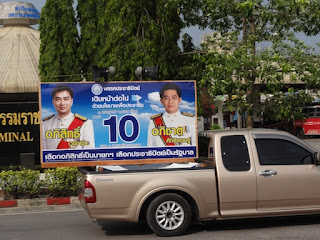The Kingdom of Thailand is a constitutional monarchy, with a free and democratic government—that is what the constitution says. The Head of State is the King of Thailand, King Rama IX, as he is usually referred to in the west. Under him there is an executive consisting of the Prime Minister and Cabinet, an elected parliament, and an independent judiciary. In accordance with the Thai constitution, which requires an election every four years, an election is currently underway in Thailand. On Sunday, the 3rd of July, the people of Thailand will elect a new government.
The modern Thai government structure dates back to 1932 when an unlikely combination of traditional aristocrats and a westernised upper middle-class Bangkok group compelled the Thai King to agree to a written, democratic constitution, which moved Thailand (Siam, as it was then known) from an autocracy to a democracy. All well and good, however, peace and domestic tranquility was not to ensure. Since that date there have been seventeen constitutions and charters, intermixed with repeated coups, military and militaristic governments, and even the occasional massacre of pro-democracy proponents by the military.
The last such coup was in 2006, when the somewhat reformist, but certainly populist, ‘red shirt’, government of Prime Minister Thaksin Shinawatra (the winner of two consecutive elections) was overthrown (while he was out of the country) and a (another) military junta took power, which wrote (another) constitution. In 2007, with this new constitution, an election was held in which a pro-Thaksin government came into office. Yet, again, peace and prosperity did not ensure. The anti-red shirt group, the ‘yellow shirts’ (there was a joke in 2008 that one had to carefully choose the colour of one’s shirt), staged a series of disruptive protests, which eventually brought the Thai government down.
The result of these protests was the assumption of office in late 2008 by the leader of the Democrat Party, which is opposed to the red shirts, the 27th Prime Minister of Thailand, Mr Abhisit. The new PM quickly attempted to ‘move on’, restore the economy and ‘heal the wounds’, but his term in office has been marked by ongoing protests and resistance to government. The greatest protest taking place in mid 2010, which was ended with blood on the streets of Bangkok.
Now, again, the Thai people have the opportunity to select their government. To do this they will elect, in a system of compulsory voting, two houses of parliament. The upper house is partly appointed, and considered a bastion of conservatism. The lower house, the House of Representatives, is where most of the action takes place, and consists of 480 members, the majority of whom are elected directly, the remainder from party lists and electoral regions. Most elections produce a party with a definite majority, but not always with an absolute majority in the parliament, thus lots of wheeling and dealing takes place to form a government.
The principal players in the current election are: Mr Abhisit, the current PM. Ms Thaksin, who is, amongst other things, the sister of the deposed and currently exiled former Prime Minister, who is leading the new red shirt party, in her first parliamentary performance. Last, but by no means least, is the Thai military, who so far have repeatedly stated that they will not involved themselves in politics.
As part of the process of informing my readers of these things, here is a sample of election posters seen by myself. These come from southern Thailand, where I am as I write, however, when I return to Bangkok I will post some posters from the capital city of Thailand.
My thanks to the following for the information presented here: wikipedia, http://tambon.blogspot.com/, and the various Thai English language newspapers and journals.
---------------------------
 |
| election vehicles, common in Thailand. |
 |
| lots of signs, everywhere. |
 |
| A red shirt campaign commitment. Seems just a tad optimistic. |
 |
| When visiting the city and province of Phatthalung I came across a group of red shirt folk. From their demeanour, I gather fairly senior folk. |
 |
| I don't know anything about this guy, but he makes a point. |
 |
| From the Muslim south. |
 |
| The Democrat party, and Mr Abhisit. |
 |
| The lady herself, Ms Thaksin. |
 |
| Red shirt trucks. |
 |
| Some are demanding a No protest vote. The goal is to remove the legitimacy of the resultant government. I gather that portraying humans as animals is rather insulting in Buddhist Thailand. |
 |
| I am not sure about this, found a batch of these in Nakhon Si town, on phone booths. Is this a joke or political commentary? |


















Comments